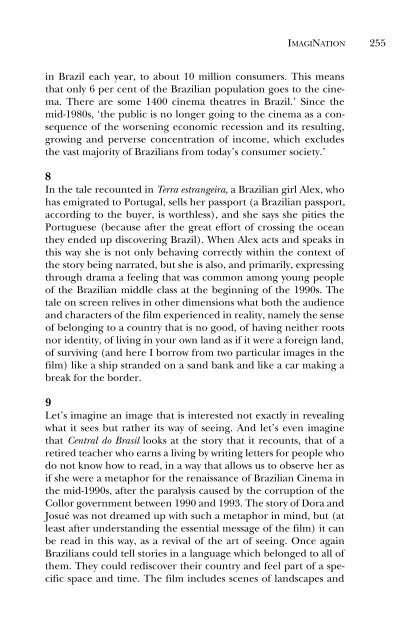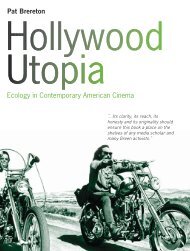- Page 2:
The New Brazilian Cinema
- Page 5 and 6:
Published in 2003 by I.B. Tauris &
- Page 7 and 8:
Part three: Documenting a country 6
- Page 9 and 10:
List of illustrations 1 Dalva (Alle
- Page 12 and 13:
Notes on contributors JOSÉ CARLOS
- Page 14 and 15:
NOTES ON CONTRIBUTORS xiii Visual a
- Page 16 and 17:
Foreword The Centre for Brazilian S
- Page 18 and 19:
Introduction This book presents the
- Page 20 and 21:
INTRODUCTION xix films maintain a s
- Page 22 and 23:
INTRODUCTION xxi differences as the
- Page 24 and 25:
INTRODUCTION xxiii ‘aesthetics of
- Page 26 and 27:
INTRODUCTION xxv of Indians in 100
- Page 28:
Acknowledgements Iwould like to exp
- Page 32 and 33:
1 A new policy for Brazilian Cinema
- Page 34 and 35:
A NEW POLICY FOR BRAZILIAN CINEMA 5
- Page 36 and 37:
A NEW POLICY FOR BRAZILIAN CINEMA 7
- Page 38:
A NEW POLICY FOR BRAZILIAN CINEMA 9
- Page 41 and 42:
12 THE NEW BRAZILIAN CINEMA tion co
- Page 43 and 44:
14 THE NEW BRAZILIAN CINEMA period
- Page 45 and 46:
16 THE NEW BRAZILIAN CINEMA and Eur
- Page 47 and 48:
18 THE NEW BRAZILIAN CINEMA n e c e
- Page 49 and 50:
20 THE NEW BRAZILIAN CINEMA CPB), t
- Page 51 and 52:
22 THE NEW BRAZILIAN CINEMA NOTES 1
- Page 53 and 54:
24 THE NEW BRAZILIAN CINEMA A compl
- Page 55 and 56:
26 THE NEW BRAZILIAN CINEMA However
- Page 57 and 58:
28 THE NEW BRAZILIAN CINEMA office
- Page 59 and 60:
30 THE NEW BRAZILIAN CINEMA The rel
- Page 61 and 62:
32 THE NEW BRAZILIAN CINEMA Every d
- Page 63 and 64:
34 THE NEW BRAZILIAN CINEMA 2) In o
- Page 66:
Part two Fiction film and social ch
- Page 69 and 70:
40 THE NEW BRAZILIAN CINEMA film: t
- Page 71 and 72:
42 THE NEW BRAZILIAN CINEMA very su
- Page 73 and 74:
44 THE NEW BRAZILIAN CINEMA disappr
- Page 75 and 76:
46 THE NEW BRAZILIAN CINEMA unknown
- Page 77 and 78:
48 THE NEW BRAZILIAN CINEMA arrogan
- Page 79 and 80:
50 THE NEW BRAZILIAN CINEMA the mot
- Page 81 and 82:
52 THE NEW BRAZILIAN CINEMA ticular
- Page 83 and 84:
54 THE NEW BRAZILIAN CINEMA to take
- Page 85 and 86:
56 THE NEW BRAZILIAN CINEMA ceeds,
- Page 87 and 88:
58 THE NEW BRAZILIAN CINEMA resentm
- Page 89 and 90:
60 THE NEW BRAZILIAN CINEMA cliché
- Page 91 and 92:
62 THE NEW BRAZILIAN CINEMA can be
- Page 94 and 95:
4 Humility, guilt and narcissism tu
- Page 96 and 97:
HUMILITY, GUILT AND NARCISSISM TURN
- Page 98 and 99:
HUMILITY, GUILT AND NARCISSISM TURN
- Page 100 and 101:
HUMILITY, GUILT AND NARCISSISM TURN
- Page 102 and 103:
HUMILITY, GUILT AND NARCISSISM TURN
- Page 104 and 105:
HUMILITY, GUILT AND NARCISSISM TURN
- Page 106 and 107:
HUMILITY, GUILT AND NARCISSISM TURN
- Page 108 and 109:
HUMILITY, GUILT AND NARCISSISM TURN
- Page 110 and 111:
HUMILITY, GUILT AND NARCISSISM TURN
- Page 112 and 113:
HUMILITY, GUILT AND NARCISSISM TURN
- Page 114 and 115:
5 Chronically Unfeasible: the polit
- Page 116 and 117:
9. Maria Alice (Bety Gofman) in Cro
- Page 118 and 119:
THE POLITICAL FILM IN A DEPOLITICIZ
- Page 120 and 121:
THE POLITICAL FILM IN A DEPOLITICIZ
- Page 122 and 123:
THE POLITICAL FILM IN A DEPOLITICIZ
- Page 124:
Part three Documenting a country
- Page 127 and 128:
98 THE NEW BRAZILIAN CINEMA started
- Page 129 and 130:
100 THE NEW BRAZILIAN CINEMA One of
- Page 131 and 132:
102 THE NEW BRAZILIAN CINEMA (Sea L
- Page 133 and 134:
104 THE NEW BRAZILIAN CINEMA At the
- Page 135 and 136:
106 THE NEW BRAZILIAN CINEMA Betwee
- Page 137 and 138:
108 THE NEW BRAZILIAN CINEMA would
- Page 139 and 140:
110 THE NEW BRAZILIAN CINEMA progra
- Page 141 and 142:
112 THE NEW BRAZILIAN CINEMA The in
- Page 143 and 144:
114 THE NEW BRAZILIAN CINEMA Brazil
- Page 145 and 146:
116 THE NEW BRAZILIAN CINEMA In San
- Page 148:
Part four Sertão and favela: the e
- Page 151 and 152:
122 THE NEW BRAZILIAN CINEMA pose t
- Page 153 and 154:
124 THE NEW BRAZILIAN CINEMA respec
- Page 155 and 156:
126 THE NEW BRAZILIAN CINEMA ments
- Page 157 and 158:
128 THE NEW BRAZILIAN CINEMA The id
- Page 159 and 160:
130 THE NEW BRAZILIAN CINEMA tims.
- Page 161 and 162:
132 THE NEW BRAZILIAN CINEMA castin
- Page 163 and 164:
134 THE NEW BRAZILIAN CINEMA may an
- Page 165 and 166:
136 THE NEW BRAZILIAN CINEMA But Lu
- Page 168 and 169:
The sertão in the Brazilian imagin
- Page 170 and 171:
THE SERTÃO IN THE BRAZILIAN IMAGIN
- Page 172 and 173:
THE SERTÃO IN THE BRAZILIAN IMAGIN
- Page 174 and 175:
16. Maria Emilce Pinto in O sertão
- Page 176 and 177:
THE SERTÃO IN THE BRAZILIAN IMAGIN
- Page 178 and 179:
THE SERTÃO IN THE BRAZILIAN IMAGIN
- Page 180 and 181:
THE SERTÃO IN THE BRAZILIAN IMAGIN
- Page 182 and 183:
THE SERTÃO IN THE BRAZILIAN IMAGIN
- Page 184 and 185:
THE SERTÃO IN THE BRAZILIAN IMAGIN
- Page 186 and 187:
10 Death on the beach - the recycle
- Page 188 and 189:
DEATH ON THE BEACH - THE RECYCLED U
- Page 190 and 191:
DEATH ON THE BEACH - THE RECYCLED U
- Page 192 and 193:
DEATH ON THE BEACH - THE RECYCLED U
- Page 194 and 195:
DEATH ON THE BEACH - THE RECYCLED U
- Page 196 and 197:
DEATH ON THE BEACH - THE RECYCLED U
- Page 198 and 199:
DEATH ON THE BEACH - THE RECYCLED U
- Page 200 and 201:
DEATH ON THE BEACH - THE RECYCLED U
- Page 202:
Part five Screen adaptations
- Page 205 and 206:
176 THE NEW BRAZILIAN CINEMA Cinema
- Page 207 and 208:
178 THE NEW BRAZILIAN CINEMA sexual
- Page 209 and 210:
180 THE NEW BRAZILIAN CINEMA ed by
- Page 211 and 212:
182 THE NEW BRAZILIAN CINEMA beginn
- Page 213 and 214:
184 THE NEW BRAZILIAN CINEMA once w
- Page 215 and 216:
186 THE NEW BRAZILIAN CINEMA forman
- Page 217 and 218:
188 THE NEW BRAZILIAN CINEMA stress
- Page 219 and 220:
190 THE NEW BRAZILIAN CINEMA The mo
- Page 222 and 223:
12 An oblique gaze: irony and humou
- Page 224 and 225:
IRONY AND HUMOUR IN HELVÉCIO RATTO
- Page 226 and 227:
IRONY AND HUMOUR IN HELVÉCIO RATTO
- Page 228 and 229:
IRONY AND HUMOUR IN HELVÉCIO RATTO
- Page 230 and 231:
IRONY AND HUMOUR IN HELVÉCIO RATTO
- Page 232:
Part six History and film history
- Page 235 and 236: 206 THE NEW BRAZILIAN CINEMA saw Br
- Page 237 and 238: 208 THE NEW BRAZILIAN CINEMA The at
- Page 239 and 240: 210 THE NEW BRAZILIAN CINEMA The do
- Page 241 and 242: 212 THE NEW BRAZILIAN CINEMA trayal
- Page 243 and 244: 214 THE NEW BRAZILIAN CINEMA who pl
- Page 245 and 246: 216 THE NEW BRAZILIAN CINEMA moroni
- Page 247 and 248: 218 THE NEW BRAZILIAN CINEMA proces
- Page 249 and 250: 220 THE NEW BRAZILIAN CINEMA gy - i
- Page 251 and 252: 222 THE NEW BRAZILIAN CINEMA side,
- Page 253 and 254: 224 THE NEW BRAZILIAN CINEMA In 199
- Page 255 and 256: 226 THE NEW BRAZILIAN CINEMA cise i
- Page 257 and 258: 228 THE NEW BRAZILIAN CINEMA mentar
- Page 259 and 260: 230 THE NEW BRAZILIAN CINEMA heavil
- Page 261 and 262: 232 THE NEW BRAZILIAN CINEMA rupts
- Page 263 and 264: 234 THE NEW BRAZILIAN CINEMA dancin
- Page 265 and 266: 236 THE NEW BRAZILIAN CINEMA The ch
- Page 267 and 268: 238 THE NEW BRAZILIAN CINEMA writes
- Page 269 and 270: 240 THE NEW BRAZILIAN CINEMA naked
- Page 271 and 272: 242 THE NEW BRAZILIAN CINEMA 01. Wi
- Page 273 and 274: 244 THE NEW BRAZILIAN CINEMA nic co
- Page 275 and 276: 246 THE NEW BRAZILIAN CINEMA ence c
- Page 277 and 278: 248 THE NEW BRAZILIAN CINEMA sweets
- Page 279 and 280: 250 THE NEW BRAZILIAN CINEMA ble el
- Page 281 and 282: 252 THE NEW BRAZILIAN CINEMA ence o
- Page 283: 254 THE NEW BRAZILIAN CINEMA with h
- Page 288: Part seven Epilogue
- Page 291 and 292: 262 THE NEW BRAZILIAN CINEMA loss,
- Page 293 and 294: 264 THE NEW BRAZILIAN CINEMA social
- Page 295 and 296: 266 THE NEW BRAZILIAN CINEMA - the
- Page 297 and 298: 268 THE NEW BRAZILIAN CINEMA within
- Page 300: Index
- Page 303 and 304: 274 THE NEW BRAZILIAN CINEMA Ao red
- Page 305 and 306: 276 THE NEW BRAZILIAN CINEMA Boniti
- Page 307 and 308: 278 THE NEW BRAZILIAN CINEMA Chroni
- Page 309 and 310: 280 THE NEW BRAZILIAN CINEMA 2000 N
- Page 311 and 312: 282 THE NEW BRAZILIAN CINEMA Fronzi
- Page 313 and 314: 284 THE NEW BRAZILIAN CINEMA Invent
- Page 315 and 316: 286 THE NEW BRAZILIAN CINEMA Maciel
- Page 317 and 318: 288 THE NEW BRAZILIAN CINEMA No rio
- Page 319 and 320: 290 THE NEW BRAZILIAN CINEMA 1999],
- Page 321 and 322: 292 THE NEW BRAZILIAN CINEMA Santos
- Page 323 and 324: 294 THE NEW BRAZILIAN CINEMA dos Sa
- Page 325: 296 THE NEW BRAZILIAN CINEMA Who St
















